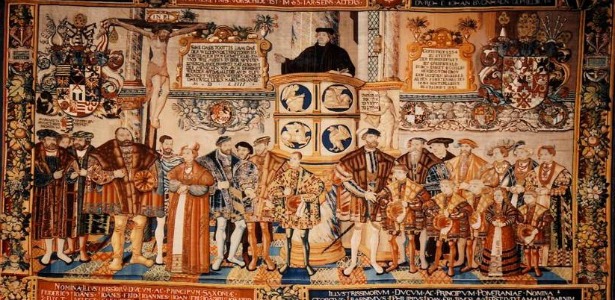This is a story about how innovation happens. It begins in 1386 after the great Papal Schism (seriously), demonstrates the ability of universities to foster capitalism, and concludes with a surprising hero of the modern world: lawyers.
Wikimedia Commons
If you want an illustration of just how crucial a role education plays in economic development, there are any number of modern case studies to choose from. You can look at India's flourishing IT industry, or China's inexhaustible supply of manufacturing engineers. You can look at the U.S. after World War II, where the G.I. bill brought college, and middle-class prosperity, to the masses.
But why stop with this century, or the last? For a dose of seriously retro economics, you can look back to the dawn of the Renaissance, where the introduction of higher education helped make possible the efflorescence of trade that built Europe's early modern economy, according to a new working paper from researchers at the University of California, Berkeley, and the University of Munich.
INNOVATION IN THE 14th CENTURY
Let's step back in time for a moment to the late Middle Ages and early Renaissance, a period from about 900 to 1500 AD when plate armor was in vogue, and Europe was transforming itself from an illiterate backwater into the world's dominant economic and military power. As authors David Cantoni and Noam Yuchtman write, the time was defined by an economic revolution, as trade expanded, local markets flourished, and workers moved from farms into small cities, where they could specialize in new occupations.
This was also the era when the continent's first institutions of higher learning were founded, starting with the University of Bologna in 1088. But did schools create thriving economies, or did thriving economies create schools? To find an answer, Cantoni and Yuchtman looked at modern-day Germany.
14th CENTURY RHINE VALLEY VS. 21st CENTURY SILICON VALLEY
Though it would one day become the mecca of dour philosophers and the Ph.D. students who love them, Germany was actually a bit late to the game when it came to establishing universities. Before the 14th century, Germany youths had to travel abroad for an education, often to modern-day France. That changed in 1386 after an event known as the Papal Schism when rival popes from Rome and France both lay claim to the leadership of the Catholic Church. German students loyal to the Roman faction were expelled from their French universities.
Suddenly, Germany had to build itself some colleges.
This bright line between Germany's pre- and post-college eras makes it an ideal test case. These schools weren't founded as the result of a hot economy. They were founded to educate students kicked out of their study abroad programs.
The authors measure Germany's economic growth before and after 1386, using how often cities were granted the official right to establish markets by either the emperor or a local lord. The red line below represents the introduction of German colleges after the Schism. Before Germany started building colleges, the expansion of "market privileges" was in decline. After colleges, they grew.
Even distant cities still seemed to see an uptick in new markets after universities were founded. Meanwhile, in countries where the education systems weren't impacted by the papal schism, such as Britain and France, nothing changed after 1386.
THANK YOU, LAWYERS
Just like today's Silicon Valley, yesterday's Rhine Valley built an economic engine on academic excellence. How? Cantoni and Yuchtman have a theory: Lawyers.
Yes, lawyers. The universities trained law students, the business innovators of the time (how things change). Legal scholars learned Roman law, which, with its emphasis on contracts and property, offered the building blocks of commerce:
Whereas customary law was very local, Roman law was universally known across Europe; whereas customary law was highly traditional, based on kinship and superstition, Roman law was an authoritative yet flexible system, that had been enriched by centuries of scholarship; whereas traditional law was informal and feuds were often preferred to trial, Roman law was written...and based on a process of rational pursuit of truth. In the particular context of Germany, with its highly fractionalized territories, these advantages of Roman law were particularly salient.
In the 14th century, law was a sort of technology. It provided massive efficiency gains in a fractious, clannish region like Germany. Lawyers were able to reprogram the economy, and help set in motion the true beginnings of capitalism. And while Cantoni and Yuchtman's data analysis is contained to Germany, they argue that a similar process may have unfolded across Europe.
And it had universities to thank.
We want to hear what you think about this article. Submit a letter to the editor or write to letters@theatlantic.com.




